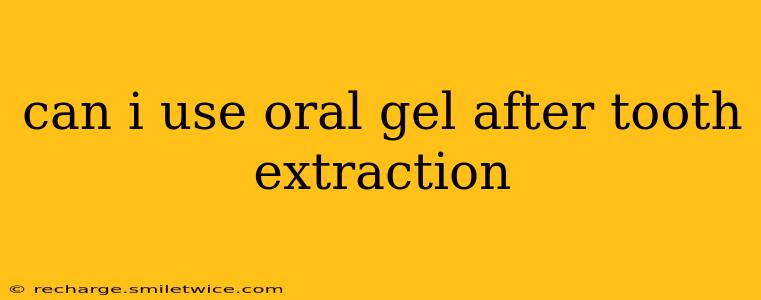Can I Use Oral Gel After Tooth Extraction?
The short answer is: it depends. While oral gels can offer relief from pain and discomfort after a tooth extraction, using the right one and using it correctly is crucial. Improper use can hinder healing and even cause complications. This article will explore the nuances of using oral gels post-extraction, addressing common concerns and providing guidance.
What Kind of Oral Gel Can I Use After a Tooth Extraction?
Several types of oral gels are available over-the-counter, each with different properties and uses. The most common and relevant for post-extraction pain relief are:
- Benzocaine gels: These provide temporary numbing relief. However, they shouldn't be used for extended periods, and some individuals may experience allergic reactions. Always follow the dosage instructions carefully.
- Orajel (or similar brands containing benzocaine): Similar to benzocaine gels, Orajel offers temporary pain relief. Again, use as directed and be mindful of potential allergic reactions.
- Gels containing lidocaine: Lidocaine is another local anesthetic that can offer temporary pain relief. Check the label to confirm the active ingredient.
- Antiseptic oral gels: These gels usually contain ingredients like chlorhexidine gluconate, which help maintain oral hygiene and reduce the risk of infection. These can be helpful in supporting the healing process.
Crucially, avoid gels containing alcohol or other irritants, as these can interfere with wound healing and cause further discomfort.
What Are the Risks of Using Oral Gel After Tooth Extraction?
While oral gels offer temporary relief, misuse can lead to complications:
- Allergic reactions: Some individuals may be allergic to the active ingredients in the gel, leading to skin irritation, swelling, or even more serious allergic responses. Always check the label carefully and test a small area first if you're unsure.
- Delayed healing: Applying certain gels improperly or using them for extended periods can hinder the clotting process and increase the risk of dry socket.
- Interaction with medications: Some oral gels may interact with other medications you're taking. Always consult your dentist or physician if you have concerns about potential interactions.
- Mask underlying problems: While providing temporary relief, oral gels mask pain, potentially delaying you from seeking necessary medical attention if a serious complication arises.
When Should I Not Use Oral Gel After Tooth Extraction?
You should avoid using any oral gel without first consulting your dentist or oral surgeon. They can assess your specific situation and recommend appropriate pain management strategies. Avoid using gels if:
- You have an allergy to any of the ingredients.
- You have a severe infection.
- You experience excessive bleeding.
- You develop signs of dry socket (severe pain, bad odor, visible bone).
How Should I Apply Oral Gel After a Tooth Extraction?
Follow these guidelines for safe and effective application:
- Clean the area: Gently rinse your mouth with warm salt water before applying the gel.
- Apply sparingly: A small amount of gel is sufficient. Excessive application won't enhance the effect and may lead to irritation.
- Avoid touching the extraction site directly with your fingers: Use a clean cotton swab or applicator to apply the gel.
- Follow dosage instructions: Do not exceed the recommended dosage.
- Avoid eating or drinking for at least 30 minutes after application: This allows the gel to take effect and prevents it from being washed away prematurely.
What Other Pain Relief Options Are Available After Tooth Extraction?
Oral gels are just one option for managing post-extraction pain. Your dentist may also recommend:
- Over-the-counter pain relievers: Ibuprofen or acetaminophen can help manage pain and inflammation.
- Prescription pain medication: For more severe pain, your dentist may prescribe stronger pain relievers.
- Ice packs: Applying ice packs to the affected area can help reduce swelling and pain.
Remember, always consult your dentist or oral surgeon before using any oral gel or other pain relief method after a tooth extraction. They can provide personalized advice and ensure you are managing your pain safely and effectively. This information should not be considered medical advice; always consult a professional for personalized treatment.
